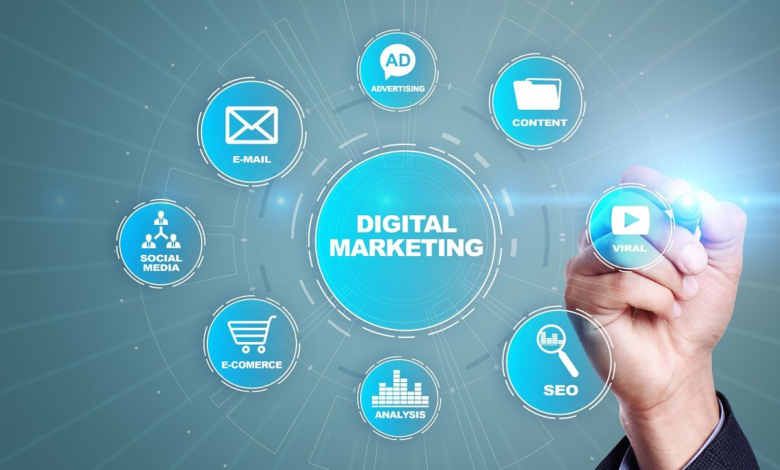Mastering Digital Marketing: Key Tactics For Driving Online Business Growth

Introduction
In the fast-evolving realm of business, where technological advancements reshape industries overnight, the significance of digital marketing stands as a cornerstone for sustainable growth and competitive advantage. In this digital age, where consumers are increasingly turning to online platforms for their purchasing decisions, buy a small businesses must adapt swiftly to harness the power of digital marketing to thrive.
The Transformative Power Of Digital Channels
Digital marketing encompasses a spectrum of strategies and tools aimed at reaching and engaging target audiences through digital channels such as search engines, social media, email, and websites. Unlike traditional marketing methods, digital marketing offers unprecedented precision in targeting specific demographics and measuring campaign performance in real time. This ability to precisely target and analyze results enables businesses to allocate resources more efficiently, maximizing ROI and enhancing overall profitability.
Navigating The Online Marketplace
Today’s consumers are not only more digitally savvy but also more discerning in their choices. They conduct extensive research online before making purchasing decisions, relying heavily on search engines and social media platforms for product reviews, recommendations, and comparisons. Consequently, businesses that establish a robust digital presence and engage effectively with their target audience across various digital touchpoints gain a distinct competitive edge.
Driving Business Growth Through Digital Strategies
The shift towards digital channels is not merely a trend but a strategic imperative for businesses aiming to expand their market reach and achieve sustainable growth. Digital marketing empowers businesses of all sizes to compete on a global scale, allowing even small enterprises to reach potential customers beyond geographical boundaries at a fraction of the cost of traditional marketing methods.
Importance Of Seo In Digital Marketing
At the heart of effective digital marketing lies Search Engine Optimization (SEO), a fundamental strategy aimed at enhancing a website’s visibility in search engine results. By optimizing their online presence for search engines, businesses can attract organic traffic from users actively searching for products or services related to their offerings. This targeted traffic not only drives higher conversion rates but also fosters long-term customer relationships based on trust and credibility.
Adapting To Changing Consumer Behavior
The advent of digital marketing has revolutionized consumer behavior, prompting businesses to adopt more personalized and customer-centric approaches. Through data-driven insights and analytics, businesses can gain a deeper understanding of consumer preferences and behaviors, allowing them to tailor their marketing efforts accordingly. This personalized approach not only enhances customer satisfaction but also increases brand loyalty and advocacy in an increasingly competitive marketplace.
Making Your Digital Marketing Strategy’s Purpose Clearly Defined
In the rapidly evolving landscape of digital marketing, defining clear goals and objectives is the foundational step towards building a successful and sustainable strategy. Without a well-defined roadmap, businesses risk squandering resources and missing out on valuable opportunities to connect with their target audience. Here’s how to establish solid goals and objectives that align with your overarching business objectives.
1. Understanding The Importance Of Goals
Setting specific goals is crucial for any digital marketing endeavor. Whether your aim is to increase brand awareness, drive website traffic, generate leads, or boost sales, each goal should be SMART—Specific, Measurable, Achievable, Relevant, and Time-bound. For instance, instead of vaguely aiming to increase sales, a SMART goal would be to increase online sales by 20% within the next six months.

2. Conducting A Comprehensive Audit
Before outlining your goals, conduct a thorough audit of your current digital presence. Evaluate your website’s performance, social media engagement, email marketing campaigns, and PPC (Pay-Per-Click) ads. This audit will provide insights into what’s working well and where improvements are needed. Use analytics tools like Google Analytics, SEMrush, or Moz to gather quantitative data on traffic, conversion rates, and audience demographics.
3. Aligning Goals With Business Objectives
Ultimately, you want your digital marketing efforts to help you achieve your company’s larger goals.Whether your company prioritizes revenue growth, customer retention, or market expansion, ensure that each digital marketing goal contributes to these overarching aims. This alignment not only increases the strategic value of your digital efforts but also facilitates better resource allocation and decision-making. For businesses looking to buy a small businesses, aligning digital marketing goals with these broader objectives becomes even more crucial. Understanding the target market, enhancing online visibility, and optimizing lead generation strategies can significantly aid in identifying and acquiring viable businesses.
4. Choosing The Right Digital Channels
SEO (Search Engine Optimization): Enhancing your website’s visibility in search engine results is essential for driving organic traffic. Conduct keyword research to identify relevant search terms your audience uses, and optimize your content accordingly. Regularly update your site with fresh, valuable content to maintain search engine rankings.
Social Media Marketing: Social media platforms offer diverse opportunities to engage with your audience through targeted content, ads, and community building. Choose platforms where your audience is most active and tailor your messaging to resonate with their interests.
Email Marketing: A well-crafted email strategy can nurture leads and encourage repeat purchases. Segment your email list based on demographics or past behavior to deliver personalized messages that drive conversions.
PPC Advertising: Pay-Per-Click ads on platforms like Google Ads or social media channels can drive immediate traffic and conversions. Target specific keywords or demographics to maximize the effectiveness of your ad spend.
5. Monitoring And Optimization
Digital marketing is iterative. Continuously monitor the performance of your campaigns against predefined metrics. Use A/B testing to refine your strategies and optimize for better results. Stay informed about industry trends and algorithm updates to adapt your approach accordingly.
The Value Of Monitoring And Online Advertising
In the dynamic landscape of digital marketing, success isn’t just about implementing strategies; it’s about understanding their impact through meticulous measurement and analysis. The practice of tracking digital marketing metrics is not merely a formality but a strategic imperative that can make or break a campaign’s effectiveness.
Understanding The Impact
Tracking digital marketing metrics provides invaluable insights into the performance of your campaigns across various platforms and channels. Whether you’re running a social media campaign, email marketing blitz, or PPC (pay-per-click) ads, each initiative generates data points that reveal crucial information:
Audience Engagement: Metrics like click-through rates (CTR), bounce rates, and time spent on page illuminate how audiences interact with your content. These insights help refine content strategies to better resonate with target demographics.
Conversion Rates: Tracking conversions—whether they’re sales, sign-ups, or downloads—pinpoints the effectiveness of your funnel. Analyzing conversion rates uncovers bottlenecks and opportunities for optimization.
ROI (Return on Investment): By correlating marketing spend with revenue generated, businesses gauge the profitability of their campaigns. This data informs budget allocation and validates marketing expenditures.
Tools For Monitoring Performance
In the arsenal of digital marketers, sophisticated analytics tools serve as the compass navigating the vast sea of data:
Google Analytics: A cornerstone for web analytics, Google Analytics offers comprehensive insights into website traffic, user behavior, and campaign performance. It tracks key metrics like traffic sources, user demographics, and conversion goals, empowering marketers to optimize strategies based on real-time data.
Social Media Analytics: Platforms like Facebook Insights, Twitter Analytics, and LinkedIn Analytics provide granular data on audience demographics, engagement metrics, and post performance. These insights enable marketers to tailor content strategies to maximize reach and engagement.
SEO Tools: Tools such as SEMrush, Moz, and Ahrefs offer deep insights into search engine performance, keyword rankings, and backlink profiles. Marketers leverage these tools to optimize content for search engines, enhance organic visibility, and drive targeted traffic.

Conclusion
The digital marketing tactics serve as a blueprint for buying small businesses seeking to thrive in an increasingly competitive online environment. By embracing these strategies and adapting to change, businesses can position themselves for sustained growth and continued relevance in the digital growth era.




